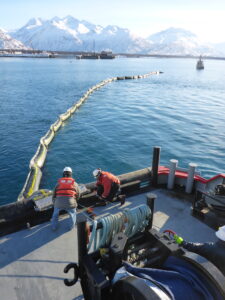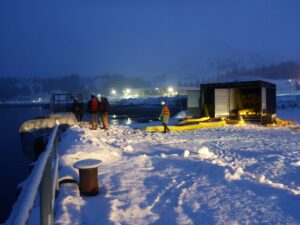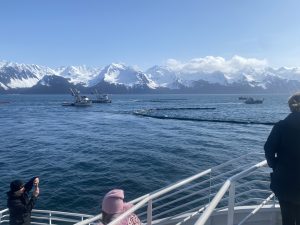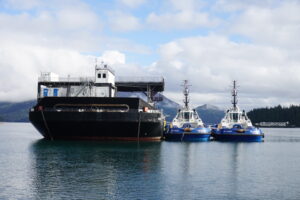Lessons learned during the pandemic here to stay

The Council’s newest annual report on drills and exercises highlights lessons learned during the pandemic and recent changes due to new technologies.
Large drills continue to take advantage of video-conferencing platforms. Meetings are held online. Documents and other data are shared through online collaboration tools.
“While the Council supports responders having as much local knowledge as possible, modern communication technologies mean some positions in the response can fully function from a remote location such as Anchorage,” says Roy Robertson, drill monitor for the Council, and author of the report.
Online learning during fishing vessel training
Alyeska’s Ship Escort Response Vessel System, or SERVS, conducts annual training for crews of local fishing vessels, who are contracted to respond in case of a spill. Before the pandemic, part of the training was held in a classroom, part was hands-on experience with equipment on dry land, and finally, crews would practice deploying equipment on the water.
Since the pandemic, the classroom sessions have been held online.
Hands-on equipment training increased in 2023
Technology can’t take care of everything. Responders still need to know how to set up and use oil spill boom, run skimmers, and communicate effectively during an emergency.
Unfortunately, crew members were not able to safely work with equipment over the last few years due to pandemic precautions. Restrictions hit two specific tactics particularly hard: nearshore response and sensitive area protection.
“Nearshore response” is a set of maneuvers used by fishing vessels to intercept the leading edge of an oil spill as it approaches a shoreline. These tactics are designed to redirect oil and collect it.
“Sensitive area protection” also happens near a shoreline. The difference is that these tactics are designed for a specific location such as a fish hatchery, cultural site, or wildlife congregation area. These tactics are planned out in advance and are designed to keep oil from contaminating the location.
Both of these tactics involve crew members being close together, so they were not regularly practiced from 2020-2022. In 2023, however, these exercises were held regularly.
Other oil spill response highlights from the report
New oil spill response barges: Over the past few years, Alyeska and the Prince William Sound shippers have been replacing oil spill response barges. These barges are stocked with response equipment and have large cargo tanks for storing collected oil. Some of the barges were up to 40 years old. The latest new barge is a replacement for the Allison Creek, which arrived in Prince William Sound in April. Read more about the Allison Creek from Alyeska. The new barges are almost identical, so training on one vessel is applicable to all.
Most likely scenario for spill from terminal: Three of five exercises at the Valdez Marine Terminal involved an area called “Drainage 58.” This is considered the most likely route that a large oil spill from the East Tank Farm would flow downhill toward Port Valdez.
Recommendations for improvement
While many of the drills and exercises went smoothly, observers did find room for improvement. Find more details in the full report: 2023 Annual Drill Monitoring Report
Report archive
Previous annual drill reports (2002-present) are available on the Preparedness Monitoring page.

 The Council held its fishing vessel oil spill response training observation tour in Seward, Alaska, on April 14, 2022. Before the COVID-19 pandemic, this had been an annual event since 2016, rotating through several communities in the region. The Seward community was invited to join the council from 11:30 a.m. to 1:30 p.m., on a Major Marine Tours vessel to observe the training.
The Council held its fishing vessel oil spill response training observation tour in Seward, Alaska, on April 14, 2022. Before the COVID-19 pandemic, this had been an annual event since 2016, rotating through several communities in the region. The Seward community was invited to join the council from 11:30 a.m. to 1:30 p.m., on a Major Marine Tours vessel to observe the training.